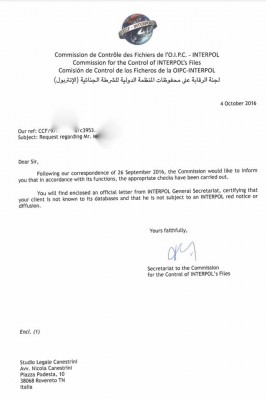The purpose of a Red Notice, according to INTERPOL, is to “seek the location and arrest of wanted persons with a view to extradition or similar lawful action.”
Srictly speaking, a Red Notice “is not an international arrest warrant.” Rather, a Red Notice is “simply to inform all member countries that the person is wanted based on an arrest warrant or equivalent judicial decision issued by a country or an international tribunal.”
Read more about Interpol red Notices in Italy
Learn more about Extradition proceeding and defence in Italy
Under Italian case law, a Red Notice legitimates an immediate arrest by police for extradition purposes: moreover, the report to Interpol by the requesting State under Italian law constitutes in itself a request for the adoption of the precautionary measure (usually: pretrial detention), preordinated to the receipt of the extradition request by same State which filed the Red Notice.
Within the European Union, Interpol red Notices are replaced by SIS alerts.
Interpol Red Notices in Italy: Time for a Rethink?
Interpol Red Notices (RNs) have become a critical tool in international criminal cooperation, allowing law enforcement agencies to locate and provisionally arrest individuals pending extradition. However, concerns about their misuse, particularly in Italy, highlight the urgent need for a reassessment of their role and implementation within the Italian legal system.
The Mechanism of Red Notices and Their Impact in Italy
Interpol’s Red Notices serve as alerts issued at the request of member states to facilitate the location and arrest of individuals wanted for prosecution or to serve a sentence. While not constituting international arrest warrants per se, they often lead to extraditional arrests and legal proceedings in various jurisdictions, including Italy.
In Italy, a Red Notice can trigger immediate detention and a subsequent extradition procedure, often placing significant constraints on an individual's fundamental rights. Recent rulings by the Italian Supreme Court (Cassazione) have confirmed that an RN alone is sufficient to justify a provisional arrest, emphasizing the gravity of such alerts in the Italian legal framework (Italian Supreme Court, Corte di cassazione ruling n. 47415/21). However, this automatic reliance on Red Notices raises concerns about procedural fairness and the protection of human rights.
Abuse of Red Notices and Political Persecution
Interpol has long faced criticism for enabling authoritarian regimes to misuse Red Notices for politically motivated persecution. Individuals, including human rights defenders, journalists, and political dissidents, have been subject to these alerts despite lacking any genuine criminal allegations against them.
Italy has recognized the risks posed by such abuses. The Supreme Court has ruled that extradition must be denied when there is substantial evidence of political persecution or a violation of fundamental rights (Italian Supreme court, Corte di Cassazione, ruling n. 31588/23). Yet, despite these safeguards, the initial issuance of a Red Notice often results in detention, reputational damage, and legal battles (and fees!) for the accused before a court ultimately determines whether the alert is abusive.
"Interpol abuse"
Sadly, and despite its duty to protect fundamental rights, INTERPOL is vulnerable to abuse by member states, which have used its systems as a mechanism of targeting legitimate activists, journalists, and political opponents under the guise of crime fighting.
Remedies against unlawful entries are theoretically possibile, but extremely difficult in practice. If the request for deleting the INTERPOL Red Notice is successful, a formal letter will be received.

In some countries, the successful action against abusive red notices in the Interpol database does NOT prevent an arrest (since national police databases may not be updated).
The Need for Judicial Oversight and Reform
The growing number of cases involving politically motivated Red Notices suggests that greater scrutiny is necessary.
While Italy does provide a judicial review process during extradition proceedings, the immediate impact of an Red Notice—leading automatically to arrest and detention—demands a more proactive approach:
-
Stronger Preliminary Assessments: Italian authorities should implement an independent review process before executing arrests based solely on Red Notices. The mere existence of an RN should not automatically justify detention without evaluating its legitimacy.
-
Enhanced Human Rights Protections: Judicial authorities must integrate an automatic screening mechanism to assess whether a Red Notice is politically motivated or violates human rights standards.
-
Greater Interpol Accountability: Italy should advocate for increased transparency within Interpol, including a faster and more accessible appeal mechanism for individuals targeted by abusive Red Notices.
Conclusion
Italy’s strict adherence to Interpol Red Notices places individuals at risk of arbitrary detention and extradition, particularly when such alerts originate from countries with questionable human rights records. Recent Supreme Court decisions highlight the necessity of balancing international cooperation with human rights protections. By reassessing its approach to Red Notices, Italy can ensure that its commitment to justice is not compromised by political misuse of international law enforcement mechanisms.
The time for a rethink is now—both for Italy and for Interpol itself.
See Nicola Canestrini's article about Interpol Red Notices (.pdf, ITA, Cassazione penale, 2019)
